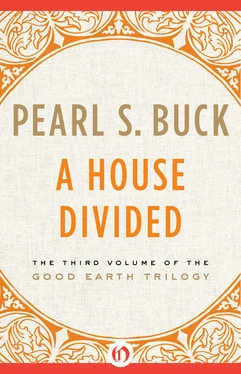Still Yuan could not say a word. His blood flushed up to his cheeks and he sat confused and shamed, and angry too. And the lady, understanding very well this confusion, smiled sadly and said once more, “I dared not tell your father, Yuan, whose only simple remedy is killing. And even if he had not been so, I could not tell him. It is a sorry end to all my care for Ai-lan, to train and school my daughter in such freedom as this! Is this the new day, then? In the old days the two would have suffered death for such a sin! But now they will suffer nothing. They will come back and live merrily and Ai-lan’s child will come too soon, but none will whisper more loudly than behind their hands, because today many children come too soon. It is the new day.”
The lady smiled a mirthless smile but there were tears in her eyes. Then Mei-ling folded up the bit of silk she sewed and thrust her needle in it and came and said soothingly, “You are so tired you do not know what you say. You have done everything for Ai-lan and well she knows it and so do we all. Come and sleep and I will fetch a broth for you to drink.”
Then the lady rose obedient to the young girl as though it were a thing she had often done, and went out leaning on her shoulder gratefully, and Yuan watched the two go, still having nothing he could say, so confounded was he by what he had heard.
So Ai-lan, his own sister, had done so wild a thing! Thus had she used her freedom. Into his own life through her had come again this hot wild thing which he had twice escaped. He went slowly to his own room, very troubled, and troubled in his old divided way, as though nothing could ever come clearly and simply to him, neither love nor pain. For now half he was ashamed of Ai-lan’s recklessness, because such things ought not to happen to his own sister, in whom he wanted to have nothing but whole pride, and yet half he was troubled because there was a hidden sweetness in this wild thing and he wanted it for himself. It was the first doubtfulness to fall upon him in his own country.
When this marriage day was over Yuan knew he must not in decency delay his going to his father, and he was eager to be gone, and the more eager because he found it sad in this home now. The mother was more quiet even than she ever had been and Mei-ling devoted her time steadfastly to her school. In the two days while Yuan made ready to go away, he scarcely saw the girl. Once he thought she avoided him, and then he said to himself, “It is because of what my mother said of Ai-lan. It is natural for a maid so modest to remember that,” and he liked this modesty. Yet when the time came when he must set forth and take the train north, he found he wanted to bid Mei-ling good-bye, and not leave to be away the month or two and not see her again. He even waited, therefore, and chose a later train by night, so that he could see her come home from her school, could dine alone with the lady and with her and talk a little quietly with them before he went.
And as they talked he found he listened for the girl’s speech, very clear and soft and pleasant, always, and not shy and giggling as the laughter of maids is sometimes. She seemed always busy at some bit of sewing, and once or twice when a servant came in to ask a question of the next day’s meats or some such thing, Yuan heard her ask Mei-ling instead of the lady, and Mei-ling gave directions as though she had done it many times. Nor was she shy in speech. This night, since the lady was more quiet than usual, and Yuan silent, too, Mei-ling talked on and told of what she did in school, and how she had long hoped to be a doctor.
“My foster mother made me think of it at first,” she said and threw her quiet beaming look upon the lady. “And now I like it very well. Only it has meant a long time to study, and a great cost, and this my foster mother has done for me, and I shall always care for her in return; where I am she shall be, too. I want a hospital of my own one day in some city, a place for children and for women, and I want a garden in the center, and round it buildings full of beds and places for the sick, — not too large, not more than I could do, but all very clean and pretty.”
So this young woman planned out her wish and in her earnestness she let her sewing lie, and her eyes began to beam and her lips to smile, and Yuan watching her, his cigarette between his fingers, thought in surprise, “Why, this maid is fair enough,” and he forgot to listen to her while he looked at her. Suddenly he felt he was not pleased and when he looked into himself to see why it was, he found he did not like to hear this maid plan out a life alone for herself and so sufficient that she needed no one else in it. It seemed then to him that women ought not to think it well to have no thought of marriage in their minds. But even as he was so thinking, he saw the lady’s face. For the first time since the marriage day her eyes were lit with interest and she heard all the young girl said. And now she said warmly, “If I were not too old I would myself do something in that hospital. It is a better day than mine was. It is a very good day when women are not forced to wed!”
This Yuan heard her say, and while he believed it, or would have said he did, still it made him feel a little strangely, too. Somehow he took it as a thing not to be gainsaid or questioned that all women ought to wed, although it was not what a man could talk about with two women. Yet their eagerness for freedom left a little coolness in him, so that when he said farewell he felt less warmly than he thought he would and bewildered in himself because he was hurt somewhere within him, but he did not know just where or how the hurt was.
Long after he had lain himself down in the narrow berth of the train he thought of this, and of the new women of his country, and of how they were, Ai-lan so free she made her mother sad, and yet this same mother rejoiced in all Mei-ling’s great free plans for her life. Then Yuan thought with a little bitterness, “I doubt she can be so very free. She will find it hard to do all she plans. And she will want a husband and children some day as all women do, doubtless.”
And he remembered the women he had known, how in any land they turned at least secretly to a man. Yet, when his memory searched Mei-ling’s face and speech, he could not truly say he had ever seen one sign of that searching in her look or voice. And he wondered if there were some youth she dreamed about, and he remembered that in the school she went to there were young men, too. Suddenly as a wind blows out of a still summer’s night he was jealous of those youths he did not know, so jealous he could not even smile at himself or ask himself why he should care what Mei-ling dreamed. He planned soberly how he must hint to the lady that she ought to warn Mei-ling, and how she ought to guard the young woman better, and he took a heed for her he never had taken for any living soul, and never once did he think to ask why he did.
So planning, as the train swayed and creaked beneath him, he fell into a troubled sleep at last.
There came much now to drive all these thoughts from Yuan’s mind for a while. Since his return from the foreign country he had lived only in the great coastal city. Not once had he seen any other thing than its wide streets, filled by day and night with vehicles of every sort, with motors and with public tramways and with people warm and brightly dressed and busy each in his own way. If there were poor ones, the sweating ricksha pullers, the lesser vendors, yet these in summer seemed not so piteous and there were not the winter beggars, who had fled from flood or famine to try a life in city streets. Rather the city seemed very gay to Yuan, a place measuring well beside any he had seen any where, and in it there was the comfort and the wealth of his cousin’s new house and the display of the marriage and all the shining wedding gifts. And as he left the lady had pressed into his hand a thick folded heap of paper which he knew was money, and he took it easily, thinking that his father sent it to her for him. He had almost forgotten now that there were poor even in the world, his own house seemed so rich and easily fed.
Читать дальше












